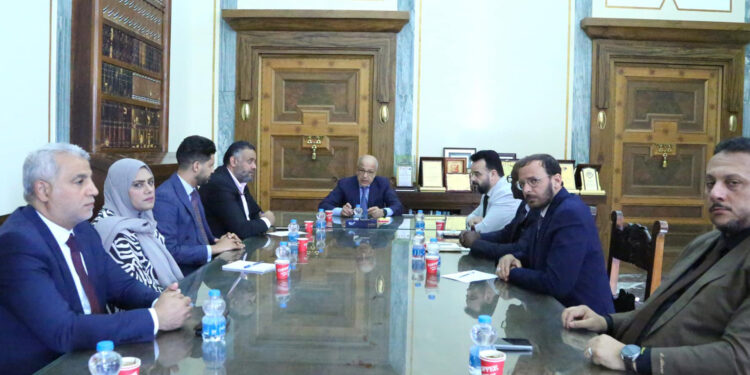The Central Bank of Libya announced the resumption of its operations after a one-day suspension, following the release of an official who was kidnapped by an unknown group.
An unknown group kidnapped the Director of the Information Technology Department, Musab Muslim, from in front of his house yesterday, Sunday.
Stop working
The Central Bank confirmed the suspension of “bank operations” until the “release” of the kidnapped director, also denouncing “the threats of kidnapping by some other officials.”
The bank said in a statement on Monday, “Al-Siddiq Al-Kabeer, the governor of the Central Bank, held an extended meeting in his office with the directors of the bank’s departments to follow up on the progress of work and the return of its systems to work, after the release of Musab Muslim, the director of the Information Technology Department, and his safe return.”
The bank published a photo showing the governor during a meeting with the central bank’s directors inside its official headquarters in the capital, Tripoli.
The kidnapping incident came a week after gunmen surrounded the bank’s headquarters in Tripoli.
While the motives for what happened are not known, local media reported that there was an attempt to force the resignation of the Central Bank Governor, Al-Siddiq Al-Kabir.
US Ambassador to Libya Richard Norland denounced what he described as “unacceptable” attempts to push the central bank governor to resign, warning that replacing him “by force could lead to Libya’s exclusion from global financial markets.”
In a post on the X platform, Norland said the confrontation in Tripoli “highlights the risks posed by the prevailing political stalemate in Libya.”
The role of the bank
For its part, the United Nations mission stressed “the importance of the role of the Central Bank of Libya in ensuring financial stability for all Libyans.”
Al-Siddiq Al-Kabeer has been the governor of the Central Bank since 2012.
Libya, with a population of 6.8 million, is divided; its affairs are run by two governments: the first in Tripoli (west) headed by Abdul Hamid Dbeibah, and the second in the east of the country, supported by parliament and retired Major General Khalifa Haftar.
Despite the relative calm that the country has witnessed in recent years, sporadic clashes between armed groups continue to occur.
The kidnapping of the Central Bank’s IT director is part of a series of events amid rising tensions between several factions, raising fears of a wider escalation.



